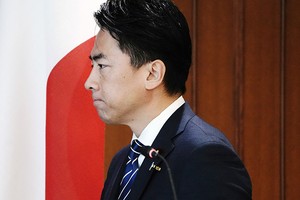September 4, 2023 at 15:30 JST
 Yuichiro Tamaki, left, shakes hands with Seiji Maehara before the new leader of their party Democratic Party for the People (DPP) is decided by voting in Tokyo’s Chiyoda Ward on Sept. 2. (Hikaru Uchida)
Yuichiro Tamaki, left, shakes hands with Seiji Maehara before the new leader of their party Democratic Party for the People (DPP) is decided by voting in Tokyo’s Chiyoda Ward on Sept. 2. (Hikaru Uchida)
Yuichiro Tamaki, the current head of the Democratic Party for the People (DPP), was re-elected in the opposition party’s leadership election on Sept. 2.
The election campaign centered around the party’s relationships with the ruling Liberal Democratic Party (LDP) and other opposition parties.
Tamaki defeated his only challenger, acting leader Seiji Maehara, by a large margin.
The election result indicates broad support within the party for Tamaki’s political agenda and strategy, symbolized by his “solution over confrontation” slogan and marked by a willingness to work with the ruling camp if necessary for achieving his policy goals.
A closer look at the outcome of the poll, however, shows Maehara, who campaigned on the importance of confronting the LDP and unity among opposition parties to unseat the dominant ruling party from power, garnered support from some DPP Diet members and the party’s prospective candidates for national elections.
The DPP should not deviate from its core mission as an opposition party, which is to keep a close and vigilant watch over the government’s actions to generate healthy tensions in politics.
The current DPP, the third largest opposition bloc with 21 Diet seats, was formed by DPP members who rejected their party’s merger with the former Constitutional Democratic Party of Japan (CDP) in 2020.
Under Tamaki’s leadership, the DPP has distanced itself from the unified opposition front including the Japanese Communist Party (JCP) formed for national elections. It has shown a clear tendency to play ball with the ruling coalition for various policy initiatives at the Diet.
Last year, the DPP went so far as to support the government’s initial budget bill in a move that was tantamount to giving the LDP-led administration a vote of confidence--an extremely unusual act by an opposition party.
During this year’s ordinary Diet session, the DPP joined forces with Nippon Ishin (Japan Innovation Party) in supporting government-drafted bills with various problems, including the revised My Number law and the revised Immigration Control and Refugee Recognition Law, helping them get enacted.
Tamaki said he supported the budget bill because Prime Minister Fumio Kishida had “promised to consider” unfreezing a trigger clause that would temporarily lower the gasoline tax. But the government has yet to take the step.
The DPP has acted like a “complementary force” of the administration. The party has played right into the hands of the government and the ruling parties, which want the opposition bloc to be divided and fragmented.
Maehara’s challenge to Tamaki’s leadership suggests some DPP lawmakers are deeply concerned about the path the party is taking.
During his campaign for the top party post, Tamaki countered the criticism about his leadership by stressing that his team is making all-out efforts to achieve the party’s policy proposals while trying to stand together with the people.
He argued that opportunistic opposition alliances for elections without agreements on policies or political principles have made voters distrustful of opposition parties. He maintained that it is time for the DPP to focus on enhancing its own power base.
Still, there is no denying that the fragmented opposition has failed to put the brakes on a series of major policy changes the Kishida administration has pushed through without seeking broad and serious public debate on its proposals.
The CDP, which as the largest opposition bloc should provide effective political leadership for uniting the opposition parties against the ruling camp, has been inconsistent in its stance toward the government and election strategy.
Nippon Ishin, which aims to replace the CDP as the largest opposition group in the next Lower House election, has acted in ways that only deepen the rift among the opposition parties.
The party’s leader, Nobuyuki Baba, has repeatedly vowed to “first crush” the CDP. He has also lambasted the JCP, saying Japan would be “better off without it.”
All opposition parties should confront the grim fact that public expectations for them remain low despite the declining approval rates for the Kishida administration and the LDP.
The current situation, if it continues, could lead to a decline in the nation’s politics.
--The Asahi Shimbun, Sept. 3




















A peek through the music industry’s curtain at the producers who harnessed social media to help their idols go global.
A series based on diplomatic documents declassified by Japan’s Foreign Ministry
Here is a collection of first-hand accounts by “hibakusha” atomic bomb survivors.
Cooking experts, chefs and others involved in the field of food introduce their special recipes intertwined with their paths in life.
A series about Japanese-Americans and their memories of World War II